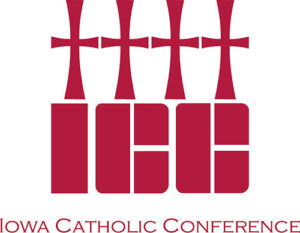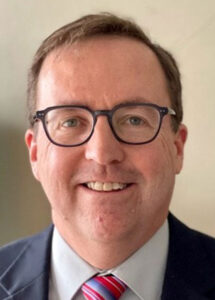 By Tom Chapman
By Tom Chapman
For The Catholic Messenger

The 2024 session of the 90th General Assembly adjourned for the year on April 20. Here’s what happened on the legislative front from the Iowa Catholic Conference (ICC) perspective:
The “standing” appropriations bill is generally the last one of the session. As it has for many years, SF 2443 limits the amount of money going to public schools to provide transportation services for nonpublic school students. The total appropriation is about $9 million. Without this limitation, funding would be about 25% higher.
SF 2443 also allocates $2 million in new money for the Department of Public Safety for 12 jobs “to address the rise in illegal immigration and related criminal conduct such as drug trafficking and human trafficking or as assigned by the commissioner of public safety.”
SJR 2004, which would require a flat income tax, passed the House. It is a constitutional amendment proposal that passed both chambers this year and will be eligible for consideration next session before it would go to a vote of the people. HJR 2006, which passed earlier in the session, is a constitutional amendment requiring a two-thirds vote of the legislature to raise the income or corporate tax. The ICC has opposed both proposals.
A new part of SF 2435, the education appropriations bill, allocates $2.1 million in new money to the Department of Education to provide professional development for teachers in public and nonpublic schools. The legislation also includes funding for a department employee to help nonpublic schools with special education issues. These are positive developments.
SF 2368, supported by the ICC, requires public schools to give charter and nonpublic schools the right to match the top offer when selling public school buildings. Both chambers passed the legislation, which now goes to Gov. Kim Reynolds for her signature.
The ICC opposed HF 2319, which the Senate passed and now goes to the governor for her signature. It forbids local governments from participating in projects in which individuals receive periodic, unearned cash payments that may be used for any purpose. The concern among legislators supporting the bill is that people will not work if they receive money with few obligations attached to it. In a Polk County program where this is being tested, more than two-thirds of the people have a job. About 30% are unpaid caregivers.
The Senate did not take up for debate HF 2672 to eliminate the tax credit for forests. A Senate amendment would have significantly improved the bill by requiring local landowners to pay only a little bit. The ICC opposed the bill as drafted. We will likely see a new version next year.
The Iowa House did not take up HF 2690, which the ICC supported. Related to the “Medicaid for employed people with disabilities” (MEPD) program, the legislation would have allowed employed people with disabilities who are married to retain more monetary resources (up to $21,000) before going over the limit and losing coverage.
In other news, Gov. Reynolds signed into law HF 2586, which allows school staff to get a professional permit to carry guns at school. HF 2652, which passed both chambers, provides funding for public schools for weapons detection systems, weapons and stipends for personnel who get one of the professional permits. That bill, which goes to the governor for her signature, requires all schools to have access to a public safety answering point (radio), funded with pandemic funds. These proposals were a top priority of the legislature.
Education Savings Account (ESA) applications are open for fall 2024, until June 30. If your family received an ESA this school year, you still must reapply. For this fall, Students First ESAs are awarded based on the following eligibility:
A student who was approved and used an ESA in the 2023-24 school year.
A student entering kindergarten at an Iowa accredited nonpublic school.
A student who attended an Iowa public school in the prior year.
A student enrolled in an accredited nonpublic school with a household income at or below 400% of the 2024 Federal Poverty Guidelines, $124,800 for a family of four.
For the fall of 2025, all students will be eligible.
(Tom Chapman is executive director of the Iowa Catholic Conference.)











